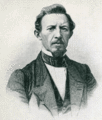Template:Selected anniversaries/June 20: Difference between revisions
Jump to navigation
Jump to search
No edit summary |
No edit summary |
||
| Line 16: | Line 16: | ||
File:Telegraph.jpg|link=Electrical telegraph (nonfiction)|1840: [[Samuel Morse (nonfiction)|Samuel Morse]] receives the patent for the [[Electrical telegraph (nonfiction)|telegraph]]. | File:Telegraph.jpg|link=Electrical telegraph (nonfiction)|1840: [[Samuel Morse (nonfiction)|Samuel Morse]] receives the patent for the [[Electrical telegraph (nonfiction)|telegraph]]. | ||
||1861 | ||1861: Frederick Gowland Hopkins born ... biochemist and academic, Nobel Prize laureate. | ||
File:Wilhelm Bauer.gif|link=Wilhelm Bauer (nonfiction)|1875: Inventor and engineer [[Wilhelm Bauer (nonfiction)|Wilhelm Bauer]] dies. He designed and invented [[Submarine (nonfiction)|submarines]]. | File:Wilhelm Bauer.gif|link=Wilhelm Bauer (nonfiction)|1875: Inventor and engineer [[Wilhelm Bauer (nonfiction)|Wilhelm Bauer]] dies. He designed and invented [[Submarine (nonfiction)|submarines]]. | ||
||1875 | ||1875: Reginald Punnett born ... geneticist, statistician, and academic. | ||
File:Wallace War-Heels.jpg|link=Wallace War-Heels|1876: Adventurer and alleged "Pirate of the Prairie" [[Wallace War-Heels]] says that he has "offered no man violence", but admits that he has "responded to violence with greater violence, many times." | File:Wallace War-Heels.jpg|link=Wallace War-Heels|1876: Adventurer and alleged "Pirate of the Prairie" [[Wallace War-Heels]] says that he has "offered no man violence", but admits that he has "responded to violence with greater violence, many times." | ||
| Line 26: | Line 26: | ||
File:Alexander Graham Bell.jpg|link=Alexander Graham Bell (nonfiction)|1877: [[Alexander Graham Bell (nonfiction)|Alexander Graham Bell]] installs the world's first commercial telephone service in Hamilton, Ontario, Canada. | File:Alexander Graham Bell.jpg|link=Alexander Graham Bell (nonfiction)|1877: [[Alexander Graham Bell (nonfiction)|Alexander Graham Bell]] installs the world's first commercial telephone service in Hamilton, Ontario, Canada. | ||
||1884 | ||1884: Mary R. Calvert born ... astronomer and author. | ||
||Benjamin deForest "Pat" Bayly | ||1903: Benjamin deForest "Pat" Bayly born ... electrical engineer and a professor at the University of Toronto. During World War II he invented a cypher machine called the Rockex and handled communications at the secret intelligence base Camp X. | ||
||John Ronald Womersley | ||1907: John Ronald Womersley born ... mathematician and computer scientist who made important contributions to computer development, and hemodynamics. Nowadays he is principally remembered for his contribution to blood flow, fluid dynamics and the eponymous Womersley number, a dimensionless parameter characterising unsteady flow. | ||
||Markus Eduard Fierz | ||1912: Markus Eduard Fierz born ... physicist, particularly remembered for his formulation of spin-statistics theorem, and for his contributions to the development of quantum theory, particle physics, and statistical mechanics. He was awarded the Max Planck Medal in 1979 and the Albert Einstein Medal in 1989 for all his work. | ||
||1917 | ||1917: Helena Rasiowa born ... mathematician and academic, | ||
||James Mason Crafts | ||1917: James Mason Crafts dies ... chemist, mostly known for developing the Friedel-Crafts alkylation and acylation reactions with Charles Friedel in 1876. Pic. | ||
||Sumner Increase Kimball | ||1923: Sumner Increase Kimball dies ... organizer of the United States Life-Saving Service and the General Superintendent of the Life-Saving Service from 1878-1915. | ||
||James Eells | ||1926: James Eells born ... mathematician, who specialized in mathematical analysis. Pic. | ||
||Eduard Ritter von Weber | ||1934: Eduard Ritter von Weber dies ... mathematician. He will work with partial differential equations, in particular the Pfaff problem. Pic. | ||
||1944: The experimental MW 18014 V-2 rocket reaches an altitude of 176 km, becoming the first man-made object to reach outer space. | ||1944: The experimental MW 18014 V-2 rocket reaches an altitude of 176 km, becoming the first man-made object to reach outer space. | ||
| Line 70: | Line 70: | ||
||2011: Professor He Zehui dies ... nuclear physicist who worked to develop and exploit nuclear physics in Germany and China. Pic. | ||2011: Professor He Zehui dies ... nuclear physicist who worked to develop and exploit nuclear physics in Germany and China. Pic. | ||
File:Ursa Nano.jpg|link=Ursa Nano (nonfiction)|2017: | File:Ursa Nano.jpg|link=Ursa Nano (nonfiction)|2017: Chromatographic analysis of ''[[Ursa Nano (nonfiction)|Ursa Nano]]'' reveals a previously unknown shade of blue, "probably as a result of latest [[cryptographic numina]]. | ||
</gallery> | </gallery> | ||
Revision as of 18:12, 14 September 2018
1840: Samuel Morse receives the patent for the telegraph.
1875: Inventor and engineer Wilhelm Bauer dies. He designed and invented submarines.
1876: Adventurer and alleged "Pirate of the Prairie" Wallace War-Heels says that he has "offered no man violence", but admits that he has "responded to violence with greater violence, many times."
1877: Alexander Graham Bell installs the world's first commercial telephone service in Hamilton, Ontario, Canada.
2010: Unlicensed Extract of Radium factory accidentally releases self-sustaining colony of transdimensional corporations.
2017: Chromatographic analysis of Ursa Nano reveals a previously unknown shade of blue, "probably as a result of latest cryptographic numina.





